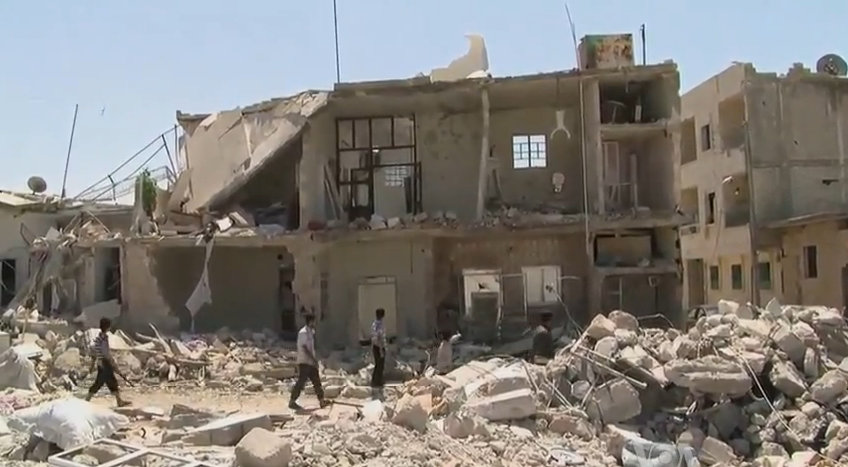
BY MITCHELL HIGHTOWER
The UK’s recent decision not to engage in war in Syria was the first time since 1782 that a British Prime Minister went to Parliament with a war proposal and lost. Domestically president Obama’s push for intervention has faced comparable resistance, and as professor Emma Sky reminded her audience, the “ghosts of Iraq” are a powerful deterrent. There are varied cases for and against a new American conflict, and the “Airstrikes in Syria” panel discussion, held in the MacMillan Center’s auditorium on Tuesday afternoon, allowed a collection of experts to express views on the situation – not only cases for or against involvement, but also the motives behind such involvement and other topics.
Present were moderator Frank Griffel, chair for the Council of Middle East Studies; Ellen Lust, Associate professor of political science; Charles Hill, diplomat-in-residence and fellow in International Security Studies at Yale; Hasan Barari, visiting professor from the University of Jordan; Emma sky, senior fellow at the Jackson Institute; and Mohamed Elfayoumy, a Yale World Fellow.
The discussion was split into two sections, a first in which each of the panelists gave four to five-minute opening statements, and a second based around questions from the audience. In opening statements each panelist came to the podium with a different priority.
“Not much changed on August 21,” asserted, Lust, emphasizing that “It wasn’t the first time” that chemical weapons have been used internationally, or even the first time that Syria has used force against its own people. She questioned whether the “red line” of chemical weapon use was, from a Syrian’s perspective, truly a pivotal moment in the conflict or only a line in the sand established in order for America to retain an appearance of leadership or influence on the situation.
For Hill leadership and influence were the paramount issues, with international players like Russia and Iran threatening to exploit inadequate US response – “permanent national ineffectiveness,” as he read off of a supposed Russian ambassador’s memo – to the Syrian situation as an opportunity to challenge American leadership.

“What happens in Syria could tip the balance so that the entire region would come under one hegemon, probably Iran,” said Hill. Because Iran is an adversary of the international system, the entire region would drop out of the world order…[That] would be a fatal blow to world order as we have known it for a very long time.
Sky acknowledged and provided explanations for the public’s profound lack of support for a new conflict, though insisted that on humanitarian grounds there was warrant for intervention, at least diplomatic if not military.
Barari focused on the possibility that US lack of response could “demoralize allies” in the region and weaken the moderate position.
Concluding the opening statements, Elfayoumi highlighted what he felt was the standard Arab perspective – that the benefit of American intervention was, if one considers history, extremely difficult to believe in.
It was in the second section that some of the focus began to turn also towards questions of why – was intervention in Syria a humanitarian issue, the first priority being to prevent the slaughter of a people? Or was the prime focus the preservation (or, from one perspective, restoration) of American status and leadership in the region? An ideological rift became apparent between Hill and other panelists on this question. Hill continued emphasis on American leadership as a top priority contrasted with the conclusion to which the other panelists seem to reach – that humanitarian concerns first are the ideal.
“The US has been the policemen of this [world order],” Hill insisted. “When we see the politicians say ‘we can’t be the policeman,’ there’s no other policeman…if there’s no policeman then the ‘bad part of town’ is just gonna get bigger. And that’s the national interest.”
Lust, on the other hand, maintained that “ending the killing should be the priority,” and even perhaps that this humanitarian attention paid to the region may in turn bolster American leadership.
So far US justification to public of involvement in Syria has, naturally, been humanitarian rather than explicitly strategic – president Obama’s Tuesday evening speech being a prime example of this fact. The current prospect of diplomacy allows the US to continue down a humanitarian path of rhetoric. Time will tell if a Russian-led diplomatic solution will prove compatible with American face-saving, or if the dialogue (and action) will change course in the coming days, but, as professor Emma Sky said, “What happens in Syria affects us whether we like it or not.”
Mitchell Hightower is a freshman in Branford College. Contact him at anthony.hightower@yale.edu.